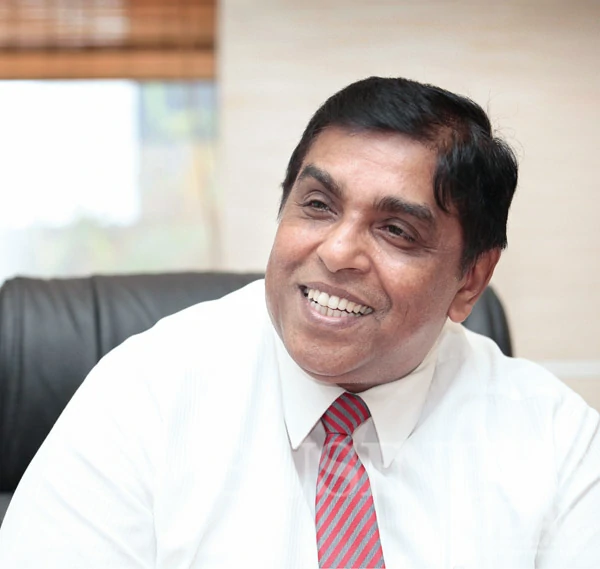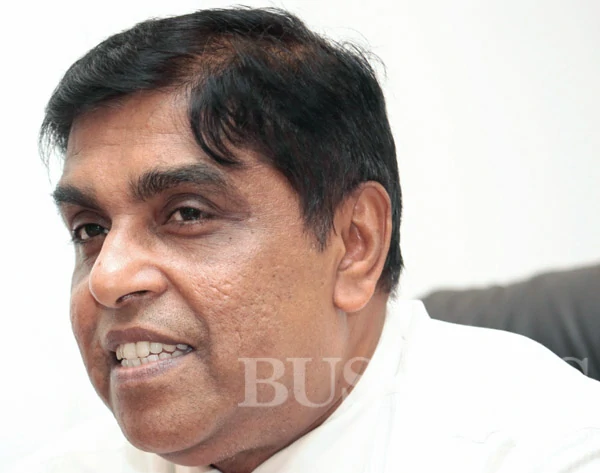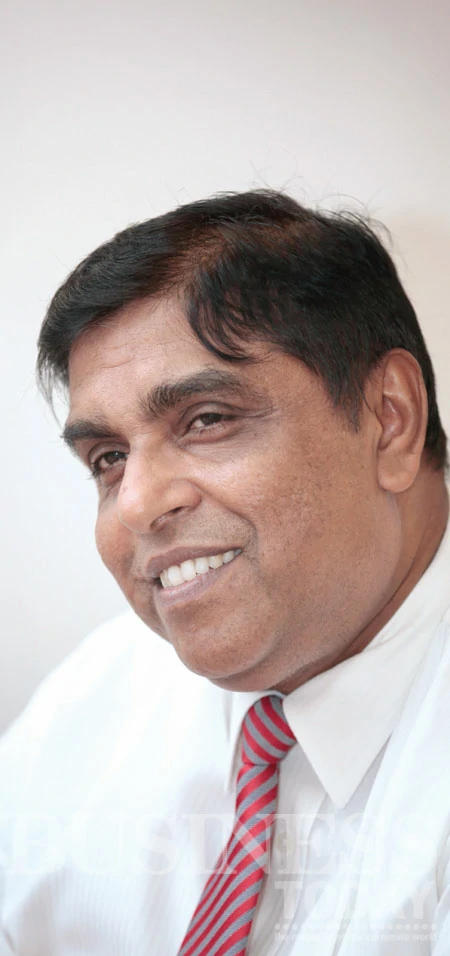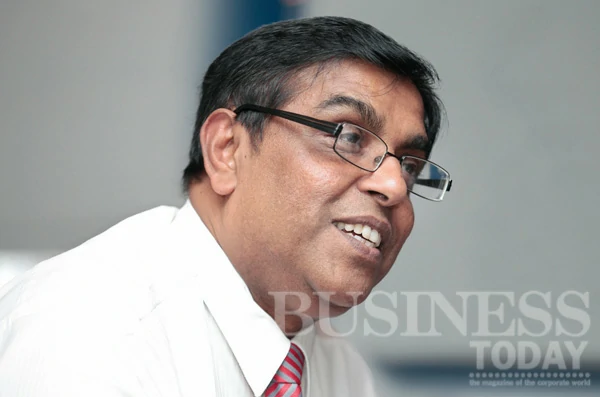
Sri Lanka Telecom (SLT), the telecommunication giant of Sri Lanka has been in the industry for nearly 150 years and as the country is undergoing rapid development, the Group is gearing up to perform its share in realising the country’s vision of becoming the Wonder of Asia. Lalith De Silva, the first Sri Lankan CEO of SLT post privatisation, with ample Telecom and IT experience in both the national and international arena, is now steering the company towards a new era where employees are encouraged to undergo a transformational change while guiding the company to meet the needs of the digital revolution. He stresses the importance of aligning with the Government’s vision.
By Udeshi Amarasinghe and Krishani Pieris Photography Menaka Aravinda
You are the first local CEO of the telecommunication giant SLT, post privatisation in 1997. Can you tell us about the journey since your appointment in
February this year?
It is a great honour to be the first
Sri Lankan CEO and I feel that the government believes in talents of its own people and has placed the utmost confidence in capabilities of Sri Lankans by extending to me the responsibility of leading the next phase of growth of Sri Lanka Telecom. Sri Lanka Telecom is an organisation that has a staff strength of about 8,000 who are all
Sri Lankans and as such the CEO has to understand the pulse of the people. To be successful in any industry in
Sri Lanka, first you have to know the culture of the people who are working as they are the most important asset. Therefore having a Sri Lankan who knows about the culture of the company and country is advantageous. Furthermore, deep understanding of the culture and the values of our customers also bring greater value to the company. I feel that it is important for the CEO of such a strategic business entity in the country to have a ‘country first’ vision. Therefore I believe it was the right call to bring in a local CEO to SLT, especially at a time when the country has a clear vision to become the Wonder of Asia along with the five hub strategy. In that respect it is important for all Sri Lankans and leaders of all public and private sector organisations to align with the government’s vision and strategies. The majority shareholder of SLT is the government, therefore we make sure that all our company’s strategic objectives and vision are very much aligned with the country’s vision as well as economic and social strategies.
At the time I was appointed as the CEO, I first had to understand SLT’s journey in the last decade in order to produce a sound assessment. Therefore, I have been looking at the history of SLT, what we have been doing in the last ten years and thinking about the next ten years ahead. You have to know as to where the company has been heading, what strengths the company has to develop and the weaknesses before looking at the next ten years. And based on what we have learnt and knowing the challenges and opportunities, we have readjusted our path to create a new long range strategic plan, which is a growth strategy that is aligned with the Government’s strategies. With the dawn of peace in the country,
Sri Lanka operates as a vibrant and globally integrated business hub. Needs of our consumers, government and corporate customers have changed dramatically. They have become quite demanding. In order to tune into this paradigm shift and lead the country’s journey towards a digital society, we needed to embark on a major transformational change. As a part of that, I had to bring innovation and innovative culture into the forefront of Sri Lanka Telecom’s strategy.
We Readjusted The Strategy To Create A New Strategic Plan, Which Is A Growth Strategy That Is Aligned With The Government’s Strategy.
I thoroughly enjoy my job and in simple words I can say, I do not get tired. I work passionately and to date I receive the fullest support from my staff. In fact, if I can contribute something everyday and change the lives of the people and bring sucesss to the businesses in this country, it will give me great job satisfaction.
Can you tell us something about yourself, and how your journey has been so far?
I am an Electronic Engineer specialised in Telecommunication. My first job was with IBM Sri Lanka and then I worked as a System Specialist in IBM Australia. Afterwards I was employed as a Senior Advisor to Saudi Telecom. I was also the CEO and a Director of Mobitel in 2002 since Sri Lanka Telecom acquired 100 percent ownership. During that tenure I was able to transform the company to a more Sri Lankan management style and I was also able to deploy the fastest ever GSM network in the world, in nine months at Mobitel. I also worked in the capacity of advisor for the Sri Lanka Telecom Board and was a board member of Sri Lankan Airlines on honorary basis. The job of a CEO is mostly to bring about change and change involves execution of large and complex projects and programmes. Being in the ICT industry has helped me greatly. A key experience that I have is managing complex and mega ICT projects. Furthermore, when you are competing with four operators backed by giant multinationals you have to understand the way these multinationals operate and my overseas experience and understanding of the best practices in multinational environments have been useful to understand our competition.
Above all, I am a social worker.
I have been actively engaged in many projects during and after the war. Since I left Sri Lanka in 1987 I have engaged in many social projects. I am a great believer in transferring knowledge to people. It is important to believe in applying spiritual values when running a business. As I have mentioned in one of my previous interviews on Dharmmik Management vs Harvard Management, it is important to complement and enrich modern management concepts with spiritual and social aspects based on spiritual teachings. I doubt whether modern businesses focus too much on ruthless profitability without considering the long term sustainability. When you focus on one area as USA, it fails, there is no exception. I feel in Sri Lanka, we are fortunate to have religious and ethnic diversity and the richness of teachings of world’s four leading religions.
We practice and we listen to good things from all four religions more than any other society. If we live these values and philosophies I feel that will greatly help one to take the company and country forward. Applying those philosophies can bring positive changes to an organisation and that is something that a great leadership should focus on.
In Australia I worked closely with the Sri Lankan high commission and Sri Lankan Associations, and spearheaded many projects to support
Sri Lanka and strengthen relations between Australian and Sri Lankan Communities. I was the founding chairman of an organisation called United Lanka Forum (ULF) in Saudi Arabia that focused on aiding to bring peace to Sri Lanka. United Lanka
Forum brought all communities together and helped in numerous ways (Island-wide essay competition among school children and providing over 600 scholarships for war effected children to promote peace by providing financial and material assistance). And the most important fact is that we managed to educate the people on the significance of peace and harmony in Sri Lanka and encouraged them to actively engage in building peace in Sri Lanka. I have also personally worked with the Saudi Embassy to help the underprivileged men and women who are working there.
I am the founder chairman of the Project Management Institute in
Sri Lanka (PMI), that was initiated in 2004. It was commenced with the blessings of the then Prime Minister, HE the President Mahinda Rajapaksa and the then Telecom Minister and current Prime Minister Hon D M Jayaratne.Now the PMI is nearing ten years and I see that the Project Management discipline has become more wide spread. In todays context with many multi billion USD mega projects being implemented in the country, Best Project Management practices are vital to realise investment objectives optimally and we can save billions on foreign exchange while successfully completing the project’s objectives.
Since your appointment in February, what are the challenges you have faced and how have you overcome these
challenges?
There are multiple challenges; coping with the ever-increasing energy cost, fluctuations in exchange rates, ensuring investment protection and realising the payback in the backdrop of the emergence of new disruptive technologies. But I reckon there are ample opportunities ahead of us and we focus on the opportunities while tackling the increasing energy cost with cost optimising initiatives. Of course, today we are enabling IP (internet protocol) in the entire network which will be completed next year. But we should have done much more in terms of innovation, such as introducing new technologies to the country while modernising the IT infrastructure. Another fact that I consider the most important one is our employees, who are the most important asset. We can talk about a customer-centric company, but if that company is not employee-centric, then I do not think we can ever be a customer-centric organisation. Therefore, today we are running a transformational change programme to change the culture of the people as we feel that our employees should be more close to the decision making process. They should be engaged in advising with the senior management at every level. We are empowering employees and being more transparent as they are part of our team.
We have rebranded our tag line as ‘one country, one voice and one team’. It is an internal concept and we are attempting to build the team spirit in the company by bringing in many new policies to change the attitudes and behaviours of the employees. The key parameter in order for SLT to go to the next level is the attitude and behavioural changes of the employees.
We have a very passionate workforce and we can do much more, if the senior management starts sharing some of the information so that other employees can be part of our decision making process. Therefore, the biggest change is this culture change programme, which is taking place.
So what are your plans for SLT?
The plan for SLT has been very clearly articulated in our strategic document. We will focus on investing heavily in new technologies such as LTE, carrier grade WiFi, cloud computing, while enhancing our fibre backbone. Fiber-To-Home has already been successfully tested. Our aim is to offer more and more IP based services to our customers to enrich lives. We will invest more into IT infrastructure to enhance operational efficiencies in an organisation. Furthermore, we are enhancing customer experience of the company in every touch point from teleshops to websites to Facebook to contact centres.
I believe that every asset of the organisation should be optimally used. We have a large property base and we are strategically thinking of starting new businesses to increase the Group’s bottom line. We have been in the Telecom Industry for 150 years and having expertise on par with international standards therefore we are also planning to provide consultancies for the region bringing much needed foreign exchange to the country. We are already looking at possibilities in Myanmar and in other developing countries to provide telecom services. I see everyday as an opportunity, where SLT can capitalise on its brand strength to acquire a larger market share in the next few years. We could have done much better. We are also working at going into
education.
If We Want To Bring In Any Culture Change Programme Or Transformation, First We Have To Create Awareness As To Why We Have To Change. The Country Is Changing And We Are Facing Fierce Competition.
Can you elaborate more on the culture changing programme?
We are conducting this culture change programme, utilising world renowned processes such as PROCI’s and ADKAR. In ADKAR process A means Awareness, D – Desire, K – Knowledge, A – Ability and R means Reinforce. For this transformation, individual and team and organisational level changes are necessary.
If we want to bring in any culture change programme or transformation, first we have to create awareness as to why we have to change. The country is changing, people’s aspirations are changing and we are also facing fierce competition. To meet these challenges and maximise on opportunities we need to create a sense of urgency among the staff and make them fully engaged in this transformation. Therefore, I addressed the SLT team, had one to one meetings, visited many regional offices, gave briefings and appointed numerous task forces. Leaders sat with the senior management team. I truly believe considering the pace of the change taking place in the country, that there is a necessity for a national culture change.
I believe that such initiatives will make country transformation more effective and long lasting.
The purpose of the culture change programme is to ensure that all staff engage in the implementation of all projects and programmes.
I Truly Believe Considering The Pace Of The Change Taking Place In The Country, That There Is A Necessity For A National Culture Change.
As a corporate, I always believe that we should have strong competition. Our target should always be to maintain our leadership in all fields. SriLanka Telecom has obtained an investment to acquire the latest technologies. When a big investment comes in, if the staff are not aligned with the project, then there is a higher possibility of failure. What we have done in SLT is a transformation programme and not a project. A project has an end date, but a programme does not. Furthermore, we focus on the outcome and not the output.
ICT is key as Sri Lanka develops the five fold hubs. Can you elaborate SLT’s role in this endeavour?
Number one is that we have the license for National Backbone Network (NBN) which is key in providing services for all operators. On NBN platform we are contemplating on fulfilling strategic broadband requirements. And in trying to become an ICT hub to serve the country and the region, we have to give consideration to all other sectors as well. From
Naval and Maritime to Aviation, Energy, Commercial and Knowledge hubs, ICT has a vital role to play.
We are in the process of modernising and expanding our network to cater to the requirements of all stake holders shouldering the development of geography-based strategic objectives. As of now we are also gearing to enable the country to meet the stipulated 2016 financial targets. We clearly understand that Sri Lanka aims to become a 100 billion dollar economy with our per capita increasing to USD 4,000. We have strategically aligned ourselves to the national agenda.
All our infrastructure and the
upgrade programme are based on
Sri Lanka’s development of the five hub concept. SLT also supports the BPO and KPO industries as we understand that Sri Lanka has a strategic objective to develop the ICT infrastructure for those industries. The country is trying to move from a 400 million dollar BPO industry to one that can bring in one billion dollars and SLT will be a key player in achieving those objectives. Therefore, all our infrastructure are aligned with the strategic objectives of the country.
SLT has been selected as a full landing point for upcoming international submarine cable project, this could be another milestone in Sri Lanka. Can you elaborate on this?
It is a great achievement not only for SLT, but for the country as well. This is the first time that the country is having full-landing with diversity in international connection in single cable. Although we had cable landing with earlier international cables too, they were landing of cable branches.
In the past years, large investments were not coming to Sri Lanka because of the conflict and political instability that were present in the country. Now that the country is having peace and political stability along with positive economic and social indicators, international confidence in Sri Lanka is increasing.
As of now, the project is in the stage of setting up of the cable station and they are already thinking of a few other investments with SLT. This project will enable us to cater to the ever-increasing demand for international access. Also, these investments will support many telecom organisations around the world. This is a great achievement for Sri Lanka.
SLT strives to provide affordable, quality and innovative services, how do you propose to achieve this?
First of all I am proud to announce that we have received the ISO 9001: 2008 standard certification for our Quality Management System (QMS). This certification covers all the local and international services and the operations of all branches Island-wide. This certification extends to every aspect of SLT, from customer care to network to IT and all other departments. Previously we had the ISO certification for certain functional areas of the business, but today we have certification for the entire company. This shows that Sri Lanka Telecom is very much focused on quality, which is a major differentiation from others. Furthermore, this quality culture that we are developing in the company will definitely bring back value to all stake-holders including customers, investors and employees.
We have achieved many other standards such as the ISO 20000 for security and we are implementing world class practices such as project management and supply chain management. These practices that were added have been tested for their quality to improve customer satisfaction, increase the efficiency
and effectiveness of organisations. Embracing these practices helps SLT to meet our strategic objectives. When we consider strategic objectives, we are not only focusing on profit as we are also focusing much on people, society and the environment based on triple P (Profit, People, Planet) concept. As the CEO, I always try to focus on all these three areas.
SLT Has Become Important Not Only Because Of The Economic Input To The Country, But Also Indirectly We Serve Almost The Entire Population.
Since I took over SLT leadership, the Chairman and the Board have given all their support and confidence to look into all these areas to take SLT forward.
SLT contributed 56 billion rupees to the GDP, which amount to 1.2 percent of the service sector. Can you elaborate on this?
This is a good indicator, however more than that a large share of the population in Sri Lanka, directly or indirectly, use our services, through our wholesale, enterprise, retail, international, entertainment, publishing, manpower and business units. In
Sri Lanka, majority of voice calls and data services utilise our infrastructure. Therefore, SLT has become important not only because of the economic input to the country, but also indirectly we serve almost the entire population. This fact is very critical and we understand the type of responsibility that comes along. In the years to come I am sure we will have more responsibilities as increasingly, internet and ICT are becoming vital for all mission-critical applications in all areas of the economy. Therefore, we understand the importance of having world class ICT infrastructure in this country.
Final thoughts.
It is most important that the private sector should re-energise itself; all their systems, processes, policies to align with the government’s strategy and vision. We have to promote a continuous learning culture. The corporate sector has to change their policies as the government is moving fast. Furthermore, we have to focus on people. People do not work only for a salary. As the CEO, I have to focus on creating a passionate workforce in an organisation. Everyone is working hard at every level in the company and identifying and giving them timely recognition is important. As a Sri Lankan CEO, I am able to speak to all levels of employees because I understand their pains and issues and they too feel comfortable to speak to me.
This Is The Right Time And There Are Great Opportunities And Potential For Any Individual Or Organisation Of This Country To Realise Their Own Dreams.
We all should be proud of what’s happening in the country and think positively. If we all believe in this vision, becoming the Wonder of Asia will not be impossible. There are many challenges, and at the same time opportunities that have been unseen in Sri Lanka since Independence. As children we have never heard of a vision for the country. Now every child in this country knows that Sri Lanka has a vision and a bigger picture to become the Wonder of Asia. In the past we did not have strategic objectives, but today we have clear strategies, that every adult and child are aware of. Furthermore, today we experience, for the first time in our lives, that major development is happening in every corner of the country. This government has realised that Sri Lanka is situated in a strategic location and understands that we have access to a population of nearly 2.5 billion with China, India and SAARC countries in the region.
As a child I have been to the Ratmalana airport, when there was no Katunayake airport. Then when Katunayake airport opened and I was going overseas in 1976, my farewell was at the airport with 150 family members and friends and the catering was done inside the airport. The airport was empty at the time, today such a function would be impossible. With the Mattala Rajapaksa Airport, it would be the same. When many people go to the Airport now, they might think that it is empty, but in five years people will be able to see it has improved. Any leadership should always think years ahead. Therefore, this is the right time and there are great opportunities and potential for any individual or organisation of this country to realise their own dreams.








